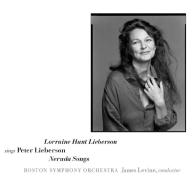Born in San Francisco in 1954, Lorraine Hunt was the daughter of an opera conductor father and a singer mother. Her father made her listen to Saturday afternoon Metropolitan Opera broadcasts on the radio and pushed her vocal gift forward, but for much of her life she was primarily an instrumentalist. She studied violin and piano as a youngster and then switched to the viola, later crediting the sensitivity to musical surroundings that violists must cultivate with influencing her approach as a singer. As a music major at San Jose State University, Hunt studied both voice and viola but gravitated toward the latter after paying the bills with a seat in the San Jose Symphony. She became involved in the Bay Area's freewheeling music scene, briefly moving to Mexico at one point after her jazz musician boyfriend was arrested on drug charges there; she bribed guards to let her live with him in a cabin on the jail site.
In 1985 Hunt played the role of Sesto in a production of Handel's Julius Caesar directed by the innovative and controversial Peter Sellars, impressing observers with her hell-for-leather performance. A role in a 1987 production of Don Giovanni under Sellars, and the theft of her uninsured viola a year later, gave her a further push toward singing. She specialized strongly but not exclusively in Baroque works, appearing consistently more often with top early music ensembles like Les Arts Florissants, with whom she performed Rameau's Hippolyte et Aricie under conductor William Christie during the 1996-1997 season.
In 1997 Hunt appeared at the Santa Fe Opera in a new work, Peter Lieberson's Ashoka's Dream. She married its composer two years later, but faced renewed challenges after being diagnosed with breast cancer and losing her sister Alexis to the disease in 2000. After undergoing a double lumpectomy, Hunt Lieberson responded artistically to this new challenge, appearing in a unique staging of two Bach cantatas (Ich habe genug and Mein Herz schwimmt in Blut) mounted by Sellars in London in 2001.
In the early 2000s, after Hunt Lieberson and her husband moved to Santa Fe, she cut back on her schedule of live appearances somewhat but continued to impress audiences with the intensity of her performances. Her relative obscurity compared with other mezzos of her talent level was partly due to her affinity for the live stage rather than the confines of the recording studio. Having been somewhat secretive about her illness, Hunt Lieberson died, much to surprise of the musical community, at home on July 3, 2006., Rovi













